Peter MALONE
Saturday, 09 October 2021 13:03
One Night in Miami
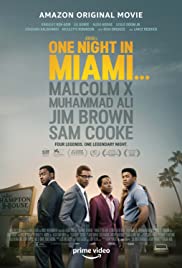
ONE NIGHT IN MIAMI
US, 2020, 114 minutes, Colour.
Kingsley Ben- Adir, Eli Goree, Aldis Hodge, Leslie Odom Jr, Lance Reddick, Christian Bagby, Michael Imperioli, Beau Bridges, Emily Bridges.
Directed by Regina King.
What do we say when we are confronted by something difficult and challenging? We need to process it. And, that is something we certainly need to do after watching this film – but, with concentration and attention, processing while watching it.
The film is an adaptation of a play by Kemp Powers, character portraits, and a reliance on interactive dialogue.
The action, after some significant introductions to the four central characters, takes place over one night, the night when Cassius Clay fought Sonny Liston who threw in the towel, Cassius Clay becoming world heavyweight champion, February 25th, 1964. The writer is interested in exploring race issues of the time, the immediate aftermath of the March on Washington and the influence of Martin Luther King contrasting with the violent approach of Elijah Muhammad and The Nation of Islam. 1964 would be a significant year in civil rights activity legislation (and, in movie issues, the same month Sidney Poitier won the Oscar for Best Actor, the first black actor to win, for Lilies of the Field).
It would be interesting to ask contemporary American audiences how much they know about the four central characters. Non- American audiences will be far less informed about some of them, even Cassius Clay becoming Muhammad Ali and the influence of Malcolm X. So, the film has the most interesting prologue, dramatising each of the four central characters, but setting each of them up for some kind of fall.
Malcolm X is in the process of separating from the Nation of Islam. He is shown as a verbal firebrand, persuasive in his speeches, a family man supported by his wife, but insisting on drawing the lines between them and us, white and black. (It is well worthwhile Googling background information about Malcolm X, his poor background, criminal activity, prison experience.) And influence on the young Cassius Clay, persuading him to embrace Islam. Then there is the singer, Sam Cooke, shown failing at the Copacabana nightclub, audiences walking out on him. The fourth character is the football player turned actor, Jim Brown. The sequence where he returns to his island home in Georgia, strong reputation, welcomed by one of the locals and his daughter, sitting on the porch,, Brown offering to go into the house to help move furniture – and then being told that ‘niggers’ are not allowed into the house. A jolting sequence – and played by Beau Bridges and his daughter, Emily Bridges.
The championship fight with Liston is shown, Clay dancing around, claiming to be the greatest. Malcolm X is a keen photographer, cheering on his protégé. They team up with Cooke and Brown and go to a hotel, Malcolm X with very serious bodyguards and security, it is to be a night of conversation, propaganda, intense examination of race attitudes in the US, the repercussions for each of the four men. Malcolm X serves as something of a conscience, especially in prodding Sam Cooke, critical of his songs, seeing him as pandering to white audiences, strong business acumen. Cook defends his approach to his talent and career, interested in collaboration. Brown has some frank talks with Malcolm X, about the world of football, of acting, of collaboration in a black-white world.
There are happy scenes. There are angry scenes. There are highly confrontational scenes. And some measured peacefulness as Malcolm X phones his wife and talks to his daughter.
So, the film is an exercise in consciousness-raising, an invitation to go back into the 1960s, to try to understand and empathise with African- Americans at this time of bigotry, Civil Rights activity, the promotion of non-violence by Martin Luther King, the violent stances of Elijah Muhammad and Malcolm X.
And, again worth googling if the information is new, Malcolm X being assassinated just over a year later (and Spike Lee’s film with Denzel Washington worth watching), Sam Cooke involved in a burglary attack and dying, Jim Brown’s long movie career – and, of course, the troubles, especially about the Vietnam war and conscientious objection for Muhammad Ali as well as his long life, successes, and, one might say, his entertaining self-promotion.
The film was directed by Oskar-Winnie? actress, Regina King.
1. Title? February 25th 1964? Actual characters? Fictitious night?
2. The adaptation of a stage play, opening it out, the retaining of the dialogue and the dramatic interactions?
3. The main action over one night, Cassius Clay fighting Sonny Liston, winning the world heavyweight title? Aged 22? The gathering of the friends, going to the hotel room, the interactions?
4. The introduction to each of the characters, highlighting the situation in the 1960s? Malcolm X, the Nation of Islam, Elijah Muhammad, Malcolm X falling out with him, leaving the Nation? His friendship with Cassius Clay, Clay as young, his career in boxing, Rome Olympics, becoming world champion? The motivation behind his conversion, background, race issues, religious? The mentorship of Malcolm X?
5. Sam Cooke, singer, his hits like You Send Me…? Reputation in the 50s and 60s? The sequence of the Copacabana, the audience, white, walking out? His wanting to succeed there? Flashbacks to other experiences and his humiliations? His business sense? Success?
6. Jim Brown, football career, his returning home to the island, the welcomed by Mr Carlton and his daughter, enthusiasm about his career and success? Sitting on the porch, lemonade? His offer to help move the furniture, his being forbidden into the house, ‘niggers’ not permitted? The humiliation for him? The jolt for the audience?
7. The hotel room, the security guards, Kareem, intensely serious? Jamaal, young, his conversion, his being in awe of the celebrities, the episode of his wanting their autographs?
8. The intensity of the conversations in the room, the break with Malcolm X going to phone his wife, his wife and her being anxious, happy with Cassius Clay, talk to his daughter? Kareem and his being watchful?
9. The conversations, Malcolm X and his strong stances, violence, lines between black and white? No alcohol? The contrast with Sam Cooke and Jim Brown? Their lives, careers, ambitions, defending themselves against the attacks by Malcolm? The strong argumentative sequence between Cooke and Malcom X? The quiet and more controlled conversation between Jim Brown and Malcolm X?
10. Sam Cooke, anger, going out? With the others, the drink, returning?
11. The group going onto the roof, the conversation continuing less claustrophobia for the audience?
12. Cassius Clay, the press conference, the questions, his religion, his change of name?
13. The main issues of race and prejudice, the heritage of slavery, slave ownership, the South, the Civil War, Jim Crow activities, lynchings? The emergence of black celebrities,
Martin Luther King and nonviolence? The Nation of Islam and violence?
14. The subsequent history of each of the four, two dead within a year or more, Jim Brown’s career, Muhammad Ali and his becoming an American icon?
Published in Movie Reviews
Published in
Movie Reviews
Saturday, 09 October 2021 13:03
Mauritanian, The
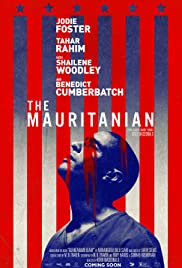
THE MAURITANIAN
UK, 2021, 129 minutes, Colour.
Tahar Rahim, Jodie Foster, Benedict Cumberbatch, Shailene Woodley, Zachary Levi, Dennis Menochet.
Directed by Kevin Macdonald
9/11. Al Qaeda. Terrorism and the war against terrorism. Guantánamo Bay.
This film reminds us of the devastation of 9/11, of loss of life, of destruction of the Twin Towers, of America being at a loss, grieving, wanting vengeance. And, while Osama bin Laden was the main target, eventually discovered and killed, it was a large number of internees in Guantánamo Bay that became the target of some of the American vengeance.
This film focuses on the Mauritanian internee, Mohamedou Ould Slahi, who wrote up his memories and experiences for his legal counsel, Nancy Hollander, which were later published as a book,, Guantánamo Diary. The screenplay for this film is based on Guantánamo Diary and the film is directed by veteran and Oscar winner, Kevin Macdonald, who has directed a substantial body of film work, both documentary and feature film.
The film opens with the Mauritanian setting, a wedding ceremony, and Slahi, taken aside, warned, leaving. Eventually, the audience learn some of his background, his going to Germany when young, finding a different way of life, caught up with dissidents, Al Qaeda, some training, visit to Afghanistan, and accused of being one of the chief recruiters and organisers of the 9/11 attacks.
We are introduced to Nancy Hollander, a tough legal expert, with social justice concerns, played by now so much older and experienced Jodie Foster. She has a young associate played by Shailene Woodley. Nancy Hollander is approached, agrees to take on the case, visits Guantánamo many times, interviews Slahi, experiences the tough security, documents in sealed envelopes, getting permission to go to archives but finding so many of the documents severely redacted, urging Slahi to write his story.
The story fills in Slahi’s experience of arrest, internment in 2002, nothing about him surfacing until 2005, his treatment by the guards, in his cell, exercise, disappearance of fellow internees, and torture – but the screenplay keeps the graphic torture sequences until the last half hour, building up the character of Slahi and his dire experiences, his confessions, and, ultimately, the impact of the torture.
Slahi is played by French actor, Tahar Rahim (The Prophet, The Past, and Judas in Mary Magdalene). He communicates a complex character, made more complex by the Guantánamo experiences, a strong screen presence.
The Mauritanian also focuses on the American prosecution of Slahi. A military colonel, Stuart Couch, who had known one of the dead pilots of 9/11 and his wife, his persuaded to take on the case. Played by Benedict Cumberbatch. Starting with a militant approach, he becomes more and more frustrated with the redacted documentation, even going to Guantánamo, meeting with the authorities who rebuff him, asking for leads from a friend who had been involved authorising torture, finally reading the documents, disgusted, a man of integrity with religious background, resigning.
While Slahi won the case, he continued interned for some time until finally being released in 2016, publishing his book, returning to Mauritania – with a final credits sequence with the actual Slahi singing an American song back home in Mauritania, Bob Dylan’s The Man in Me, with an American accent and enthusiasm.
(While Zero Dark Thirty had sequences of torture, the 2019 film, The Report, with Adam Driver and Annette Bening, can be recommended as a drama exploring the legislation about torture, obfuscation of the investigation, the eventual repeal.)
1. A film about terrorism, consequences? In the context of 9/11? Al Qaeda? Guantánamo Bay? Justice, interrogations, charges and no charges, torture?
2. The work of the director, documentaries, features, a focus on justice issues? The screenplay based on the book by Mohamedou Ould Slahi?
3. The title? Scenes in Mauritania, the recruiting of Al Qaeda?
4. The United States and 9/11, shock, twin towers, deaths, destruction? The war against terror? A vindictive America? Blame? The rounding up of the suspects, the opening of Guantánamo Bay? Internment, secrecy, interrogations, the introduction of torture (and these sequences, graphic, left to the latter part of the film)? Legal issues, prosecutions?
5. The introduction to Slahi? Mauritania, local dress, the ceremony, the celebration? His being taken aside? The warnings? The background of his home life, family, customs, Islam, moving to Germany, studies, associations, recruitment, training, Afghanistan? Alleged connections to 9/11? Recruiting, organisation?
6. His later denials, the torture and confessions, the discussions with Nancy, preparing the case, his writing, eventually the publication of the book?
7. His internment in Guantánamo in 2002, the beginning of the case in 2005, the range of flashbacks to illustrate what had happened to him, arrest, transport, blindfold, arrival, treatment, naked, search, prison clothes, the cell?
8. The flashbacks, the box screen format, his memories, factual material, the buildup to the treatment, exercise in the yard, the next man and learning of his suicide, the treatment by the guards, cuffed and turning, cuffed at the back, meals? The taunting by the guards? Scenes of Nancy reading the manuscript? The second manuscript, the descriptions of the torture?
9. The sequences of the interrogations, the Americans, one black, one white, the translator? Good cop, bad cop style? The prolonged interrogations, offering deals?
10. Concerned groups about the internees, New Mexico, Nancy and her practice, Teri as her assistant, approaches made to her for the defence of Slahi? Nancy as a character, age, strict, social concern? Teri as apprentice? The other members in the office?
11. The visits to Guantánamo, strict security, documentation, supervision, sealing documents? The conditions for the interviews, Slahi and his surprise, initial reactions, smiling, sceptical, the development of the relationship between him and the interviewers, with Teri? Persuaded to write his story?
12. The development of the case, the legal aspects and Nancy’s investigations? Her being objective, the effect on him, not just a case but a person? Going to the authorities, the security, the sealed documents, so many with blackout, redacted? The discovery of the confessions, Teri and her behaviour, going to Thanksgiving dinner, Nancy firing? Teri later returning, accepted, working with Nancy?
13. The prosecution, the choice of Stuart Couch, his friendship with the pilot, the meetings with the pilot’s wife, move for justice and some vengeance? His own family, religious background? His military service? The commission, the men on his staff? His making contacts, especially with Neil Buckland, social contact and friendship, the pool game, continually asking him for information, leads, Neil and his reluctance? The co-workers, suspicions, authorisations being removed and their being sacked?
14. The case against Slahi, the documentation, Couch and his frustrations, the authorities and his interviews, their putting him off? His visit to Guantánamo? The encounter with Nancy and the discussions? Growing frustration, Neil giving the information about the torture, documentation, reading it? His conscience? What the religious ceremony and the affirmation of faith and integrity? His resignation?
15. The building up of the case, the judge, the hearings,,Slahi and his speaking via the screen and camera, Nancy and her presentation?
16. The verdict in favour, but his remaining interned for many years, eventual release, the publication of his book? Returning to Mauritania?
17. Back home, cheerful, the actual Slahi and his very Americanised singing of the song?
18. The reality of the internees in Guantánamo? American motivations? American treatment? The issue of torture and its being banned? American justice?
Published in Movie Reviews
Published in
Movie Reviews
Saturday, 09 October 2021 13:03
Two of Us/ Deux
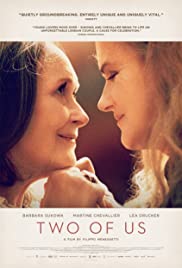
DEUX/ TWO OF US
France, 2019, 99 minutes, Colour.
Barbara Sukowa, Martine Chevallier, Lea Drucker.
Directed by Filippo Meneghetti.
France’s nominee for the Academy Award for Best Foreign Language Film, 2021. Golden Globe nominee, winner of the Cesar award for best first feature direction. Many further distinguished nominations. Strong expectations – and, they are well fulfilled.
The tone is set in the prologue, two little girls playing hide and seek, one dressed in black, one in white, the girl in white disappearing. This episode is replayed with sad consequences later in the film, symbolic, when we identify the girl in black with the central character of the drama, Nina.
Then we are introduced to two elderly women, Nina and Mado, intimate, ordinary domestic sequences, yet revealing their deep relationship with each other. In fact, we have to glean the information about their past from various conversations throughout the film, but, especially a finely dramatic sequence (after an hour’s running time) where Nina explains to Mado’s daughter, something of her past and their past, the camera focusing in close-up on Mado’s eyes and tracking steadily towards them for extreme close-up. The director uses many of the stylistic devices to reveal characters and to help us appreciate their personalities, their emotions, the relationship and the demands on it.
There have not been so many dramas focusing on older women and same-sex relationships, the pressure on each of the women, the secrecy, finding the right moment for revelation. This is especially true for Mado, married for many years, tyrannical husband, two adult children, the son resenting his mother’s attitude towards her father, the daughter, a hairdresser, tending her mother, and her son, a young boy, devoted to his grandmother. The right moment comes – but it passes. And there are consequences, some sad and disturbing consequences.
And, for review, that is more than enough information. This is a drama which has so many unexpected developments, turns, the audience wondering where it is leading, where it can be leading. To know nothing about these developments helps, quite considerably, one’s response to the characters, consequences which both enhance and puzzle.
Barbara Sukowa, veteran actress in European and American films, has the opportunity for one of her best performances as Nina. Martine Chevallier is Mado, quite a demanding performance, more passive than active. The tension is strong, especially with the responses of Mado’s daughter and with Muriel, a nurse who becomes involved in care for Mado.
One might not have expected this film to be France’s nomination for the Oscars, but, after experiencing it, one can understand this choice.
1. Awards and nominations? Strong personal drama? Relationship issues? Same-sex issues? Age?
2. The French setting? The city? Streets, shops, apartment blocks? Interiors, apartments, hospital? Hospice? The musical score? The theme song for the couple dancing, its repetition?
3. The prologue, the two little girls, one in black, one in white, hide and seek, the girl in white disappearing – the images in the film of white dress under the water, the recap to the girl in black pulling the girl in white from the water? Symbolic?
4. The introduction to Mado and Nina, their age, intimacy, the relationship? The domestic details of their life together? The plan to sell the apartment, the estate agent coming and photographing, the discussions with Nina? The possibility of going to Rome, an apartment on the Tiber? Memories of where they met?
5. Mado’s birthday, getting her hair done by her daughter, her son and his criticisms, the daughter and their son, the cake, the candles? Mado intending to tell her children about her relationship? Failing?
6. Mado in the shop, Nina smoking in the street, the encounter with the estate agent, Mado looking through the window, Nina’s discovery, her aggressive behaviour, name-calling about lesbians? The consequence? Mato’s stroke and collapse? Nina’s calling the ambulance?
7. The effect on Nina, feelings of guilt, at the hospital? The discussion with Anne?
8. Muriel being hired, care for Mado? Excluding Nina? Nina coming in during the night? Continuing to offer to help, the deal with Muriel, Nina smashing the car, offering to pay? Muriel leaving the door open, the search for Mado? Muriel being fired? Her later return with her son, demanding the money, the smashing of Nina’s apartment?
9. Mado, gradually walking, paying attention, Nina playing their song ? Nina lying on the bed with Mado, being discovered by Anne, the reaction, taking Mado to the hospice? Mado and her behaviour, the bingo, the phone number, ringing Nina, Nina going to the hospice?
10. Anne seeing their leaving through the window, going to the apartment? Nina, taking Mado, discovering the apartment disturbed, the ruining of the plan to escape?
11. Anne, knocking at the door, the couple not opening, their dancing together – and leaving the audience to speculate on what would happen?
Published in Movie Reviews
Published in
Movie Reviews
Saturday, 09 October 2021 13:03
Face in the Crowd, A
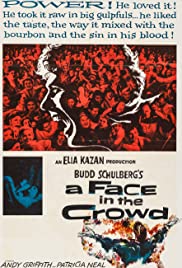
A FACE IN THE CROWD
US, 1957, 126 minutes, Black-and-white.
Andy Griffiths, Patricia Neal, Anthony Franciosa, Walter Matthau, Lee Remick, Kay Medford.
Directed by Elia Kazan.
A Face in the Crowd was Elia Kazan’s immediate follow-up to his success with On the Waterfront and East of Eden. Kazan and his family came from Anatolia (and he filmed his family story in America, America), Kazan trying as an actor, then setting up the Actors Studio, success with stage productions, moving into films, winning an Oscar for best director for Gentlemen’s Agreement and a second for On the Waterfront. He collaborated here with Budd Schulberg, adapting his own short story (and Schulberg had written On the Waterfront).
This is the story of a guitar playing drifter, introducing Andy Griffiths to cinema. The film is also a star vehicle for Patricia Neal as an agent who promotes the guitar player, enabling him to have a career first in radio then in television. Walter Matthau also appears as an agent. In the supporting cast are Anthony Franciosa and first film for Lee Remick.
This is a story of an unlikely rise and fall, the drifter with an ego, certainly having talent, ability to communicate with people, connecting with them, who hurts people in his life, including a young wife played by Lee Remick, alienating his promoters who get him on television in New York. He exploits his talent, moves to promoting politicians, he traps himself by criticising – and, his agent then exposes him.
Abandoned by friends and promoters, he nevertheless is able to continue on. A critique of the making and promoting of media personalities – and their talents as well as destructive tendencies.
1. The work of Elia Kazan? Directing career? Bud bd Schulberg and his writing career? Adapting his short story?
2. The Southern American settings, the Ozarks, Arkansas? The move to the wider American cities? North and South? The musical score?
3. A media story? The 1950s? Musician, his power of communication, music and words? His being picked up and promoted? Programs, influence, politics? Ego? Rise and downfall?
4. Andy Griffiths, first film, as Lonesome Rhodes, drifter, guitar playing, his marriage, his skills? The encounter with Marcia, her seeing his talent, backing him, promoting him, the stages of his development? Popularity? His skill at ad-libbing, communicating with his audience? Meeting the various agents? Meeting Betty Lou, the infatuation, marrying her? And the revelation about his first wife? Betty, her affair with Joey? Lonesome dismissing her?
5. Politics, the senator, Lonesome becoming involved, promotion? The tangles?
6. Marcia as a character, her age, experience, promotion? Her working with Mel Miller, his work, talent scout? Wary of Lonesome?
7. The mattress episode and its significance?
8. The transition to New York, the television program, promotion, the male enhancement product? Senator Fuller, the endorsement? The role of Joey?
9. Lonesome and his ego, the clash with Marcia, the divorce, rejection of Betty Lou?
10. The clash of personal relationships, business interests? Hostility towards him?
11. Marcia, the set up with the microphone, the expose and the consequences?
12. Downfall, the interaction with the servants, the applause machine? His final yelling out, Marcia and Mel and their departing?
13. A critique of media in the 1950s – and relevant to succeeding decades and developments in media, especially social media?
Published in Movie Reviews
Published in
Movie Reviews
Saturday, 09 October 2021 13:03
Nest, The
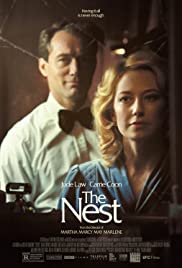
THE NEST
UK/Canada, 2020, 107 minutes, Colour.
Jude Law, Carrie Coon, Oona Roche, Charlie Shotwell, Wendy Crewson, Michael Culkin, Adeel Akhtar.
Directed by Sean Durkin.
What does it profit…? A gospel question that has been dramatised so often over the centuries and finds itself the subject of many morality plays, many films. And, this is certainly one of them.
Interesting to speculate on the title. The nest could refer to the security of the family life. The nest could also refer to the security of a home where everyone can feel at home. So, something of both in this story.
The world is that of corporate business, the showiness of business in the United States, less flamboyant but equally ambitious business in the United Kingdom.
This is the story of Rory O’ Hara, played with quite some flair by Jude Law. He certainly does not want to allude to his humble beginnings, although he has to go back there and acknowledge them at some stage. Rather, he is the corporate star has come from London and is prospering in the US, married to his wife, (Carrie Coon) and with a son and a daughter, the daughter at that troublesome age of self-assertion and discovery of the world of sexual encounters, drugs, rebellion against parents. The younger son, on the other hand, is bookish and rather introverted.
But this is not enough to satisfy Rory, making arrangements and deals behind his wife’s back so that they can return to England where he can find a superior position, buy a mansion in the country, a house in London, his wife setting up a stable (she is an equestrian trainer), the children finding new friends and schools.
The American dream? The British dream? But, of course, the morality play nightmare!
Like many ambitious businessman, Rory overrates himself and falls foul of reality. Allison becomes more desperate, the children more tangled in their problems. At the end, Rory insists that Alison come to a corporate dinner, for wooing clients – but, she cuts through his pomposity and lies, walks out, Rory left with his close friend who is tired of being exploited by Rory and also walks out.
The screenplay certainly tackles the problems – but, ultimately might not be without some hope, as Rory and Allison return home, encounter the children, everybody back at the nest with the possibility of confronting reality and the future.
1. The title? Homes in US? The stately UK mansion? Family and guests, safety, building, security?
2. The American settings, homes, equestrian training, business offices? Socials? Restaurants? The transition to the UK, the stately home, the countryside, interiors? London streets and buildings? Offices and interiors? Restaurants and clubs? The countryside? The musical score?
3. The story of Rory O’ Hara, British, denying his ancestry, but the later visit to his mother, anger at his father, her lifestyle, inquiries about his brother? His business career, sent to the US by Arthur Davis? His success in the US? Wanting something more? The phone call to Arthur Davis, transferring to the UK? His relationship with his wife, second marriage, her daughter? Their son? Social living and affluence?
4. The gradual revelation of Rory O’ Hara, ambitions, greed is good, taking charge, relationship with Arthur Davis, suggesting the deal, anger and its not going through, confronting Davis, Davis putting him down? His relationship with Steve, co-worker, discussions, outings of the football? Yet betrayal, the Norwegian fish farms? The dinner, his wife’s behaviour, the breaking with Steve?
5. The move to England, his ambitions, the rent on the house, wanting something in London, ever avaricious? His work, success, over-reach? Ambitious intuitions, not attending to detail?
6. Allison, her background, the sequence with her mother and their getting on well? Her relationship with her daughter, her age? Her son? The happy scenes in the US, the home, swimming pool, playing football, the bonding with Rory? His being an exemplary father? The proposal to go to the UK, her not really wanting it, Rory making the decision? Equestrian training, working for a boss, Rory suggesting she have her own business?
7. Life in London, in the countryside, the vast house, loneliness, Sam, wanting her privacy, Benjamin, not wanting to be called beanie? Dependence on their mother, picking up from school, their being late? Allison and her not getting up, the buying of the horse, entering into the training? Satisfaction?
8. Issues of money, her keeping some for herself and hiding it from Rory? His promise of big deals and income? Lavish payments, meal outings and his paying the bills? Paying for the horse? Being in need, wanting to borrow from Allison?
9. Allison, her reactions, riding her horse, its collapse, the neighbour, putting it down, support from her children? The tractor, the burial of the horse? Rory away, the news, his wanting to sue the person selling the horse? Insensitive?
10. The pressures on Allison, her going to work on the farm with the neighbour, satisfaction?
11. Getting ready for the dinner, wanting Sam to look after Benjamin? Her going to the dinner, drinking, her blunt challenging Rory, going out, frantic dancing, home late, the remnants of the party?
12. Benjamin, wandering? Sam inviting all the friends, the party, drugs, noise, shambles?
13. Rory, embarrassed by Allison at the dinner, looking for her, wanting the evening with Steve, his blunt telling the truth and leaving?
14. Rory, the taxi driver, confiding in him, explaining his work, but able to explain his ambitions, saying that he was pretending to be rich? The driver dumping him? His walk home?
15. The open ending, the experiences of war for England, some disillusionment, Rory coming into the house, the family being together? A future?
Published in Movie Reviews
Published in
Movie Reviews
Saturday, 09 October 2021 13:03
Non Odiare/ Thou shalt not Hate
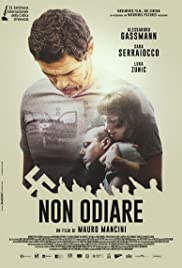
NON ODIARE/THOU SHALT NOT HATE
Italy, 2020, 95 minutes, Colour.
Alessandro Gassman, Sara Serraiocci, Luka Zunic, Lorenzo Buonora, Lorenzo Acquaviva.
Directed by Mauro Mancini.
The title is phrase like one of the 10 Commandments. This is a contemporary drama about Jews in Italy, descendants of Holocaust victims, the rise of neo-Nazis. It is set in the city of Trieste a.
We are introduced to a surgeon, a man of some integrity, played by Alessandro Gassman. He carries a family burden that his father did dental work for the captors in the concentration camp.
The drama begins when he goes to the rescue of man who has crashed his car. He then discovers neo-Nazi symbols. The car victim was one of the leaders of the local fascists. While the surgeon had acted as a Good Samaritan, the consequences are, at times, quite dire for him.
He becomes the target of a group of neo-Nazis, especially the son of the crash victim. But, he also encounters the young man’s sister who has somewhat different views. He is attacked, but is asked to be the Good Samaritan again, when his young attacker is wounded and he is faced with the human decision about helping him.
The film takes a somewhat more optimistic tone than might have been anticipated, the possible rehabilitation of the young attacker. But, the surgeon, despite entanglements with the family, retains his integrity.
1. The title? A commandment? In the context of World War II, the Holocaust, memories, fascist traditions, neo-Nazis?
2. The Italian setting, the city of Trieste? The streets, the homes, the views? The surrounding countryside? River, kayaking? The musical score?
3. Simone’s story, the presence of Alessandro Gassman, age, doctor, seen in surgery, his skills? The family background, alienation from his father, his father’s war experiences, the camps, dental work for the captors and Simone’s reaction? His father leaving? Simone’s apartment, lavish? His father’s house, the furniture, junk, shambles? Simone intending to sell, the removal of the furniture? The visit with Marica?
4. The opening, the peace of the kayaking, the cars, the crash, Simone going to the rescue, and Antonio, his injuries, Simone helping, discovering the neo-Nazi symbols, SS, swastika? Unbinding his leg, letting the man die? His attitude, the aftermath, conscience? The news about the dead man, art, jobs, his family?
5. The neo-Nazis, the audience seeing the funeral, the skinheads, the salute?
6. Simone, seeing Marica, putting up the notices, following her, his paying off his cleaner, inviting Marica, the tour of the house, cleaning twice a week, the payment, the diligence, cleaning? The attraction?
7. Marica at home, the interactions with Marcello? Paolo and his age, coaching him? Marcello and his anger, anti-Semitic, violent reaction? He and his thugs attacking Simone in the street? Marica not worrying about the Jewish background? Paolo and his visit, his frank questions about being Jewish, Simone taking him to the park to play?
8. Simone, following Marica, going to the supermarket, the later questioning him? The continued attraction? Marica and her detachment, explaining her past, accountancy, the sense of debt to the family? Looking at the planes and wondering about their destinations?
9. Marcello, the meeting with Rocco, friend with his father, yet the debt, the huge amount, the time limit? Rocco trying to find the money, Marica pawning jewellery, prepared to sell the car? Marcello approaching Rocco, the discussion, Rocco relentless, Marcello stabbing him, Rocco shooting him, Rocco’s death? Marica bringing Marcello to the house, Simone and his decision to help Marcello? Marcello reacting to having Jewish blood? The transfusions, the bullet, Marcello and his recovery? In the house, the meal?
10. Simone and the relationship, Marcello looking out the window? A future?
11. Marcello, hair growing again, working in the garage? Simone and the kayaking? What future?
12. The Jewish issues woven into the characters and the narrative rather than declarations and speeches?
Published in Movie Reviews
Published in
Movie Reviews
Saturday, 09 October 2021 13:03
Francesco
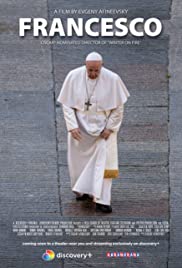
FRANCESCO
US, 2020, 116 minutes, Colour.
Pope Francis.
Directed by Evgeny Afineesky.
This is the fifth major feature film focusing on Pope Francis. There was a 2015 Argentinian drama, Francisco, El Padre Jorge; there was the 2015 Italian drama, Call Me Francis; worldwide audiences watched The Two Popes, 2019, a fictionalised encounter between Francis, played Pryce and Benedict XVI, played by Anthony Hopkins. In 2019 there was a documentary by celebrated German filmmaker, Wim Wenders, Pope Francis, a Man of his Word, with limited release (but, Googling the title and adding You Tube, several previews as well as some substantial clips can be found).
Francesco has been acquired by the Discovery Channel, with limited screenings, but with rental or video on demand.
Francesco completed filming in April 2020, featuring the Pope and an assistant on the dais altar in an empty piazza in front of St Peters. But, at the end, there is enthusiastic footage from countries all over Europe and the United States, people in lockdown, but coming to their windows and doors, waving, shouting, applauding – images of hope (not yet fulfilled). This film is a lively and challenging overview of Pope Francis’ seven years as Pope, 2013-2020.
The director is Russian and has made a number of documentaries, focusing on the war in Syria, conflicts in Ukraine, as well as a documentary about divorce. In this film, as with Wim Wenders’ documentary, the words of the Pope are significant, from public addresses, to more personal encounters, to interview statements. But, these films are not simply “talking heads� documentaries. The director and his assistants have done extensive research all over the world, finding a powerful range of footage from Pope Francis visits to different countries, to meeting significant personalities, and striking and vivid footage to illustrate the particular crises around the world of his seven years’pontificate.
Instead of providing some background to Francis, his Argentinian and Jesuit backgrounds, his work as Archbishop in Buenos Aires, two key issues are initially highlighted. The first is that of climate change, the Pope’s document, Laudato Si, his visit to the Philippines in the wake of the severe typhoons. The second issue is that of migrants throughout the world, his visit to the refugees on the island of Lampedusa, refugees from Africa, refugees from Syria and visuals of the desolation of ruined Aleppo…
With this social consciousness in mind, the film then goes to the portrait of Francis, a sketch of his life, photos of his family, the story of their migration from Fascist Italy, growing up in Argentina, his vocation, joining the Jesuits, his role as Jesuit provincial – and quite a section later taking up the issue of accusations of collaboration with the Generals during the Dirty War, vocal criticism, examination of the issues, some critics retracting, the Pope explaining a more silent approach to work behind the scenes, followed by two years seeming exile away from Buenos Aires. It seems this period gave him time to reflect, to mellow his stances, to be conscious of the poor, something he took to his ministry as Archbishop.
The film provides quite a number of clips of Cardinal Bergoglio and his work in Argentina, continually with the poor, taking public transport, but also his strong interfaith links.
There is quite a challenge as the film documents Francis’ visits to conflict centres around the world, to the Central African Republic, to the island of Lesbos to meet the refugees, to Myanmar where diplomacy required no mention of the Rohingya, to Bangladesh and meeting the refugees. He also goes to Mexico denouncing walls that separate instead of building bridges which reunite (and a glimpse of President Trump). There is also the sequence of his addressing the American Congress (with Joe Biden, then VP, sitting behind the Pope).
There is a very personalised sequence where the Pope has a Zoom conference with those working on the American-Mexican? border, especially his singling out unknown a nun, champion of the poor, and a close-up of his more affectionate language with her.
There are several other very personalised encounters, the three Muslim families that he brought back to Italy as an example of leaders welcoming refugees, his visit to them, their testimonies, the finding home and employment in Italy. Then there is the father who wrote a letter to Francis, giving it to him at an audience, explaining that he and his gay partner had three children, wanting the Pope’s assistance in their being accepted at the parish school. The Pope phoning the father, encouraging him, the film including a quotation of the Pope talking about recognition of gay men and women in society, of civil unions… The film does not quote, “who am I to judge?�, but includes this more ordinary episode.
The issue of women in the church is raised, a number of speakers, the Pope emphasising that women must have roles in the church – but, interestingly, for all the ceremonies, those assisting and servers are all male.
But, the treatment of sexual abuse by clergy is presented in a tantalising way, something like the old-fashion serials, the audience left with cliffhangers, wondering what and when the sequel will be. In fact, the subject does receive quite a lot of attention but in separate sections, increasing in dramatic tension, throughout the film. There is the sequence where the Pope seems to have lost his temper accusing critics of the Chilean Episcopacy of slander. Later, especially with interviews with Juan Carlos Cruz, the leader of the young men who accused the Chilean celebrity priest, Karadima, of years of abuse, presenting his case, being invited to the Vatican, wary that it was a PR exercise, meeting the Pope, hearing his apology, having a three hour conversation, present at a papal audience. Then there is the episode, surprising those in Chile, of summoning the Chilean bishops, firing a number of them, declarations about stricter investigations, the sending of official investigators to Chile, their 2,300 page report…
Juan Carlos Cruz is one of a significant number of authoritative talking heads throughout the film.
So, here is an opportunity, a two hour consideration of Pope Francis, growing awareness of all the world situations where he has intervened. But, there is a chance to see him at greater length in close-up, with people (as with his Jewish and Muslim long-time friends as well as leadership of churches and world religions), his body language, his unsteady walk, for instance, in Auschwitz, the close-ups when he is speaking officially, or in homily, or in personal encounters.
Not the last word. Not the last image. But an opportunity to make some kind of assessment, some kind of appreciation (and, one hopes, a good impression on those Catholics who have publicly expressed disagreement with or condemnation of, Francis) of an unanticipated Pope and seven years of unanticipated papal service.
Published in Movie Reviews
Published in
Movie Reviews
Saturday, 09 October 2021 13:03
French Exit
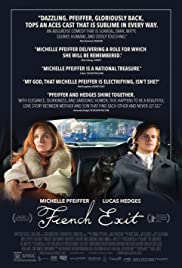
FRENCH EXIT
Canada/Ireland, 2020, 110 minutes, Colour.
Michelle Pfeiffer, Lucas Hedges, Tracy Letts, Valerie Mahaffey, Susan Coyne, Imogen Poots, Danielle Macdonald, Isaach de Bankole, Daniel Di Tommaso, Eddie Holland.
Directed by Azazel Jacob.
French Exit is a striking title. However, this drama of an ageing, self-preoccupied, New York wealthy woman may strike audiences differently.
On the one hand, Michelle Pfeiffer gives an impressive performance as Frances, her marriage behind her, her coldness towards her husband leaving him dead at home when she went on holidays, the police even arresting her, but now finding that her finances are running out. What to do? The suggestion is that she go to Paris, stay in an apartment owned by a good friend, take her young son with her, and take all the cash and do with it as she wishes. She does.
On the other hand, Michelle Pfeiffer’s performance is so good that for many it may be quite alienating, not eliciting the sympathy which, she often says, she does not crave, but, in her heart of hearts she does. And, of course, we suspect that she is ill.
So, enjoyment of the film will depend on the response to Michelle Pfeiffer. And, some response to her son, played by Lucas Hedges (who has had quite a number of screen mothers over the years: Julia Roberts, Frances McDormand?, Nicole Kidman, Meryl Streep as a mother-figure, is attempting some kind of independence, even engagement to his girlfriend, Susan, Imogen Poots, but very much acting as a sponge for his mother’s emotions. She had virtually abandoned him to boarding school when he was young.
What has intrigued many viewers is the touch of magic realism, suggested on the voyage to France by an encounter with a young medium, Danielle Macdonald, who has some strange powers, employed to search for a missing cat (which Frances believes her late husband inhabits). In fact, Frances’ eccentricities lead to all kinds of people coming to live in the flat, a bereaved widow who craves company, the private investigator hired to search for the medium, even the fiance and her current boyfriend…
Another intriguing aspect is what Frances does with her money, leaving inordinate tips, gifts to unsuspecting types, even young man harassed by the police outside her window knows that she is giving him too much and offers her some back. Facing death, living in Paris, wandering the streets, does Frances eventually discover some self-awareness. At a moment of kindness, she does remark that she has made a slight move, which is something.
So, an appeal to some audiences, detachment or alienation for others.
1. The title? Frances, her life, the move to Paris, her death?
2. The New York settings, affluent society, apartments, offices, Society life in parties?
3. The Paris settings, streets and buildings, the river, not the tourist sites? Apartments, interiors, parks restaurants, the musical score?
4. Michelle Pfeiffer’s performance as Frances? Award nominations? Age, widow, mother? Wealth? Self-absorbed? The background of her husband’s death, her finding him dead, going on holiday, returning, the police, the best in prison? The reputation? Abandoning her son, collecting him from school after his father’s death? The close relationship between mother and son, her dependence on him, his being something of a sponge, absorbing her reactions? His relationship with Susan? Engagement? Hesitating to tell his mother?
5. Frances and the financial situation, the discussions with the adviser, the condescending manner? His revealing the truth? The advice to sell everything? Her doing so, getting the cash, storing the cash? Talking with Joan, Joan’s offer of the apartment in Paris? Telling Malcolm, leaving?
6. On the boat, the accommodation, Malcolm and the encounter with Madeleine, her acting as a medium, the reaction of her client (in the news that she died of a heart attack, and the comment of the ship’s doctor)? Malcolm talking with Madeleine, their night together, her leaving? His mother’s reaction in reference to carnal knowledge? Frances, her cat, driving it, smuggling it into France, her comments to the customs man?
7. Going to the hotel, lifestyle, at the restaurant, the smug behaviour of the waiter, Frances setting the flowers on fire?
8. The invitation by Madame Reynard, going to the party, Madame Reynard by herself, her story, Frances being rude, Malcolm trying to smooth the situation? Madame’s drinking? The meal?
9. Madame, her character, her grief, drinking, talking, moving into the apartment?
10. Frances and the cat, the revelation that she thought her husband was in the cat? The flashbacks, his death, his corpse, the cat licking him? The cat scratching her, the disappearance of the cat? Her being upset? Malcolm suggesting they find Madeline with her psychic powers?
11. Julius, giving him the brief, his response, the extra money? His return, with Madeleine? Their both moving into the apartment?
12. Malcolm phoning Susan, her coming to Paris, with Tom, former boyfriend, Tom and his challenge to Malcolm, arm wrestling, Susan and her love for Malcolm, Tom leaving? Susan
remaining?
13. Madeleine, the seance, the search for the cat?
14. Joan, Francis writing the card but leaving it at the restaurant, the waiter posting it? Talking about her terminal illness? Joan, concern, amazement at all the people in the apartment? Listening to Frances, advising her?
15. Frances and the money, stored in the wardrobe, lavish tips, giving the money away, giving the money to those begging in the street, her watching the police with the protester, meeting him later, giving him the money, his taking a small portion – advice to give it to the other man, his snatching, his running? Eventually the money running out?
16. Frances, walking the street late at night, and making her exit?
Published in Movie Reviews
Published in
Movie Reviews
Saturday, 09 October 2021 13:03
Golden Voices
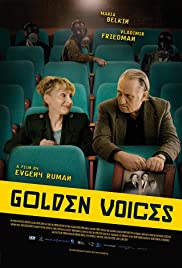
GOLDEN VOICES
Israel, 2019, 88 minutes, Colour.
Maria Belkin, Vladimir Friedman, Uri Klauzner, Alexander Senderovich.
Directed by Evgeny Ruman.
This is something of a gentle entertainment for older audiences. And, the plotlines are quite unpredictable.
The opening explanation indicates that the Jews in the Soviet Union were able to leave after its collapse, from 1990, many making their way to Israel. For many, especially the older migrants, it was an uprooting from their way of life, their work, their language, having to learn Hebrew as Well Is find employment.
The golden voices of the title belong to Raya and Victor, both in their 60s, whose career has been in dubbing films for many decades. They are delighted to be in Israel, Victor photographing Raya at the plane, a relative finding them an apartment, their going to Hebrew classes to, hauntingly, say something about their day. And, it is the period of the Gulf War, Saddam Hussein aggressive, and they line up for their allotted gas masks.
The film immerses its audience in the atmosphere of Israel at the time, apartment blocks, interiors, the streets, the cinema, video shops, offices…
The central part of the film dramatises how Raya and Victor find some work. If this review so far has been tantalising and you would like to see the film, don’t read any further because there are spoilers (some spoilers you might not expect at all!).
For those reading on, Victor gets involved in illegal dubbing with a couple who run a store of illegal videos, films which they photograph secretly in the cinema, falling foul of the cinema owner.
Raya answers an advertisement in the paper, and finds that it is a phone sex operation – saying no, thinking it over, saying yes, really entering into the spirit of the calls for lonely Russian migrants. There is what turns out to be quite a delightful sequence when she agrees to meet one of the customers with gently unexpected consequences.
Two other things to add: Victor has a passion for Fellini, having a photo with the director from the Moscow Festival, 1963, promoting 8 ½ against Soviet censorship and the film winning the main award, and his dubbing Fellini’s Voices of the Moon in Israel. The other thing is that, during the screening, Saddam Hussein sends rockets on Israel, reminding us of reality along with the fantasies.
An entertainment for older audiences.
1. The title? The central couple and their career in dubbing films? And the irony of how they had to use their voices on migrating to Israel?
2. The information about Jews in Russia, the collapse of the Soviet Empire, possibilities for migration, migration to Israel? Russian language, learning Hebrew? Finding jobs and support?
3. Israel in 1990, migrants, settlements, the Gulf War, masks, fear of attacks, missiles?
4. The serious background of the film, yet the comic touches, tongue-in-cheek? The musical score?
5. Israel, homes and apartments, the streets, seedier areas, the phone sex office, the video store, the cinema?
6. Raya and Victor, in their 60s, no family, migrating at that age, the challenges, the photo of the plane? The relative, finding them an apartment, settling in? Going to Hebrew lessons, the teacher, people explaining their day in Hebrew?
7. Financial difficulties, advertisements, Raya making the phone call, visiting the office, the discovery of phone sex, her reaction, her return, the payment, the other women on the phone? The boss and encouragement? The name of Margarita? The phone calls, the first, tentative, getting into the role, the usual speil? The phone calls from Gera, his stuttering, radio making contact, drawing him out?
8. Victor, the video store, Dustin Hoffman, his knowing the lines, reciting them, the managers of the store, filming in the cinemas, the dubbing? Effective and ineffective? The proposal to Victor, his going to the cinema, the associate with the camera, a couple kissing in front, then making a success, Victor and his dubbing? The arrest in the cinema? The owner and his complaint? But letting Victor go?
9. The cinema manager, his proposal, to set up a cinema for the Russian migrants, the dubbing? Victor and his memories, the decades of dubbing, his story about Fellini, the photo with Fellini, Moscow Festival, 8 ½, Soviet censorship, Victor’s defence, 8 ½ winning the prize? Dubbing Fellini’s Voices of the Moon, the screening, Victor and his emotions?
10. The issue of the gas masks, the fear of Saddam Hussein, attacks? Raya leaving hers behind, Victor coming to the office, her rejection, the attack, the people in the cinema and their masks, his going to the office, Raya going to the cinema, his return, finding her, the reconciliation?
11. Victor, the sex phone call, Raya and Margarita, his disillusionment, the confrontation, her reaction, accusing him of controlling everything? Her leaving, being helped by the boss
at the phone sex office?
12. Gera and his call, wanting to meet Margarita, her eventually agreeing, his presence of the statue, with the bouquet, her watching from the restaurant? His wanting to go to the toilet, her saying he was a customer, their talking, their bonding, his driving her home, her eventually confessing, his stating that she had been sent by Margarita and his wanting to know what she would say about him? A genial episode?
13. The humanity of the story, the oddball situations, morally dubious? The unpredictability of the story? And the reconciliation?
Published in Movie Reviews
Published in
Movie Reviews
Saturday, 09 October 2021 13:03
Godzilla vs Kong
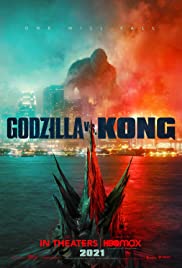
GODZILLA vs, KONG
US, 2020, 113 minutes, Colour.
Alexander Skarsgaard, Rebecca Hall, Millie Bobby Brown, Kaylee Hottle, Demian Bechir, Julian Denison, Brian Tyree Henry, Lance Riddick, Eiza Gonzalez, Kyle Chandler.
Directed by Adam Wingard.
If ever there was to be an action show to be seen on the largest screen, this is a principal contender. It looks very good up there on the screen, especially the action sequences and lots of special effects.
Of course, the title tells all. In fact, there are two major battle sequences between the two alpha-creatures, Godzilla (the baddy) and King Kong (the goody). And, as if this would not satisfy most audiences, a dastardly corporation entrepreneur is creating a Robo-Godzilla? to control the world!
So, the creatures are the most important focus. Here is King Kong (with memories of all the films from the 1930s on), in retirement, one might say, on Kong Island. There are scientists there who are keeping an eye on him in his environment, keeping him safe. Rebecca Hall is one of the main scientists but communication is had with Kong through a young girl whose parents had been killed. She is deaf, uses sign language, and has been able to communicate with Kong response to her. Very nice.
In the meantime, what is Godzilla up to? Destruction, of course, invading the city and, looking more gigantic than ever, smashes everything in sight and within distance of his swinging tale. (Giving new meaning to a smash hit!).
However, Walter Simmons (Demian Bechir) has the most enormous plant you have ever seen for technological development, not only of the surface but 33 storeys down. And, when Godzilla tears into this, he has an alternate plant in Hong Kong (and the tunnel from the US to Hong Kong which two youngsters, who team up with an investigative plant who wants to expose Simmons, Madison (Millie Bobby Brown) and Josh (Julian Denison – from the Wildepeople – with his New Ziland iccent intact) all travel down.
Simmons employs the help of a scientist, Nathan Lind, Alexander Skarsgaaard, who teams up with Kong’s protectors to transfer him to Antarctica and an underground prehistoric jungle, with deadly pterodactyls, but containing King Kong’s original throne and sceptre. The screenwriters’ imaginations have been working overtime!
If we accept the plot and its, to say the least, improbabilities, and enjoy the portrayal of the two alpha-creatures, especially the fights and effects, there should be no complaint!
1. The title? The audience getting precisely that? Plus the Robo- Godzilla?
2. The plot, comic-strip, the focus on the monsters, the subsidiary human characters? The plausibility of the plot – comic-strip imagination?
3. A film to be seen of the big screen, the special effects, the action? Large spectacle?
4. The situation with King Kong, the movie tradition, on Kong Island, Kong and his being observed by the scientists, protected, the communication with the little girl, her being deaf, sign language, as learning it? Ilene and her role on the island, protecting Jia? Kong and his happiness, reigning supreme, in his jungle habitat?
5. Walter Simmons and his Empire, technical explorations, ran as his assistant, the Robo creations, Ren and his control? The headquarters in the United States, vaster than could be imagined, surface, the many storeys underground? His ambitions? The creation of the robotic Godzilla? His potential? Simmons and his ambition for power?
6. Godzilla, in the city, gigantic size, in the water, the absolute destruction? Returning to the sea? The alpha creature, wanting to be the sole alpha-creature?
7. Simmons and his transferring to the Hong Kong office, its vastness, working on the Robo Godzilla? The tunnel from the US to Hong Kong?
8. Godzilla’s threat to Kong, Simmons and his visit to Nathan Lind? Lind and his expertise? Commission to go to Kong Island, Simmons sending his daughter? Spy?
9. Nathan, meeting Ilene, Jia, communication with Kong? The need for rescue and resettlement? The decisions, the vehicles, flight, Antarctica, going below, the alternate prehistoric world, the flying creatures, Kong and his becoming acclimatised, fighting off the creatures, devouring them, eventually finding his throne and his sceptre?
10. Simmon’s daughter, contact with her father, supplying the information? The attack and the crash and her death?
11. The subplot with Madison and Josh? Her father and his work for Simmons? The investigations, the encounter with Bernie, his being a plant, his research, photographs, video, the plan to unmask Simmons? Their working together, the discoveries, the threats? Transition to Hong Kong? The discovery of the Robo Godzilla, wanting to protect Kong, the equipment, the satellite, Josh and his IT work, the irony of Bernie and his beer, pouring it on the computer, saving the day? Madison reunited with her father?
12. The staging of the fights between Kong and Godzilla, the first, the water, the ships, their gigantic size, destruction of the ships, the planes? The buildup to the second conflict? The dramatics? The introduction of the Robo- Godzilla? Their turning on it, its destruction?
13. The possibility of reconciliation, the two alpha-creatures? And Kong returning to his kingdom?
Published in Movie Reviews
Published in
Movie Reviews